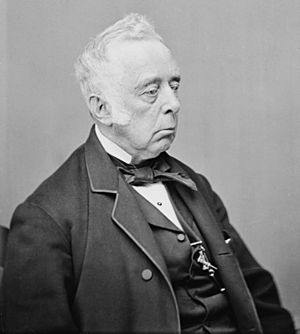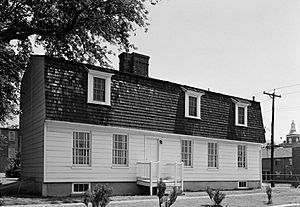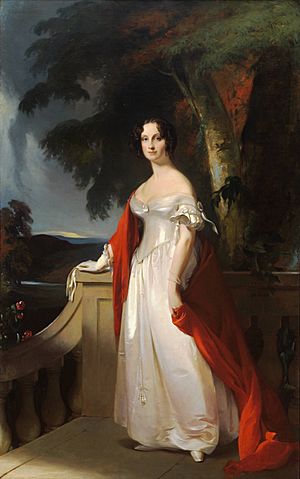Reverdy Johnson facts for kids
Quick facts for kids
Reverdy Johnson
|
|
|---|---|
 |
|
| U.S. Minister to the United Kingdom | |
| In office September 14, 1868 – May 13, 1869 |
|
| President | Andrew Johnson Ulysses S. Grant |
| Preceded by | Charles Adams |
| Succeeded by | John Motley |
| United States Senator from Maryland |
|
| In office March 4, 1863 – July 10, 1868 |
|
| Preceded by | Anthony Kennedy |
| Succeeded by | William Whyte |
| In office March 4, 1845 – March 7, 1849 |
|
| Preceded by | William Merrick |
| Succeeded by | David Stewart |
| 21st United States Attorney General | |
| In office March 8, 1849 – July 21, 1850 |
|
| President | Zachary Taylor Millard Fillmore |
| Preceded by | Isaac Toucey |
| Succeeded by | John J. Crittenden |
| Personal details | |
| Born | May 21, 1796 Annapolis, Maryland, U.S. |
| Died | February 10, 1876 (aged 79) Annapolis, Maryland, U.S. |
| Resting place | Green Mount Cemetery |
| Political party | Whig (before 1860) Democratic (1860–1872) |
| Spouse |
Mary Mackall Bowie
(m. 1819; |
| Children | 15 |
| Parent |
|
| Relatives | John Johnson Jr. (brother) |
| Education | St. John's College, Maryland (BA) |
| Signature | |
Reverdy Johnson (born May 21, 1796 – died February 10, 1876) was an important American politician and lawyer from Annapolis, Maryland. He was known for being a skilled defense attorney. He defended famous people like Sandford in the Dred Scott case. He also defended Maj. Gen. Fitz John Porter at his military trial. Later, he defended Mary Surratt, who was accused of helping in the assassination of Abraham Lincoln.
Johnson was first a member of the Whig Party. He strongly supported the Union during the American Civil War. At first, he did not agree with efforts to end slavery during the war. But by 1864, he changed his mind. In 1865, he supported the 13th Amendment, which officially banned slavery. From 1868 to 1869, Johnson served as the United States Minister to the United Kingdom.
Contents
Reverdy Johnson's Early Life and Education

Reverdy Johnson was born in Annapolis, Maryland, on May 21, 1796. His father, John Johnson, was a well-known lawyer and politician in Maryland. His father served as the Attorney General of Maryland from 1806 to 1811. Later, he became the Chancellor of Maryland. Reverdy's mother was Deborah Johnson.
Reverdy graduated from St. John's College in 1812. After college, he decided to study law. He became a lawyer in 1815, ready to start his legal career.
Reverdy Johnson's Career as a Lawyer and Politician
In 1817, Johnson moved to Baltimore, Maryland. There, he worked with other famous lawyers like Luther Martin and Roger B. Taney. Taney later became the Chief Justice of the United States. Johnson was appointed as the chief commissioner for people who couldn't pay their debts in Maryland in 1817.
From 1821 to 1825, he served in the Maryland State Senate. After that, he returned to his law practice for 20 years.
Serving in Federal Politics
From 1845 to 1849, Johnson represented Maryland in the United States Senate. He was a member of the Whig Party at that time.
In March 1849, Johnson became the Attorney General of the United States. He served under President Zachary Taylor. He left this job in July 1850, shortly after Millard Fillmore became president.
While Attorney General, he helped defend the Wheeling Suspension Bridge in a legal case. This bridge was important because it connected two parts of the National Road. Even though people argued the bridge blocked a river, it was never torn down.
In 1856, a crowd protested against Johnson in Baltimore. They burned a dummy of him because of a speech he made.
Johnson later became a conservative Democrat. He supported Stephen A. Douglas in the 1860 presidential election. He also represented the slave owner in the famous 1857 Dred Scott v. Sandford case.
Reverdy Johnson and the Civil War
Even though he represented a slave owner, Johnson personally did not support slavery. He played a key role in keeping Maryland from leaving the Union during the American Civil War.
He was a delegate to the Peace Convention in 1861. From 1861 to 1862, he served in the Maryland House of Delegates. During this time, he defended Maj. Gen. Fitz John Porter in his military trial. Johnson argued that Porter's good service record should protect him. However, Porter was found guilty.
After the city of New Orleans was captured, President Abraham Lincoln asked Johnson to review decisions made by military leaders. Johnson changed those decisions, which pleased the government. After the war, Johnson believed in a gentler approach to Reconstruction. This was different from the "Radical Republicans" who wanted harsher changes.
Returning to the U.S. Senate
In 1863, Johnson returned to the United States Senate and served until 1868. He became very interested in the antislavery amendment. He saw it as a clear way to solve the problem of slavery in the country.
In 1864, Johnson gave a speech in the Senate. He strongly declared his antislavery views. He supported the immediate end of slavery everywhere. He also pushed for the proposed amendment to the Constitution that would ban slavery forever in the United States.
In 1865, he defended Mary Surratt in a military court. Surratt was found guilty and executed for her role in Lincoln's assassination. In 1866, Johnson was a delegate to the National Union Convention. This convention tried to gain support for President Andrew Johnson.
In the Senate, he also worked on the Joint Committee on Reconstruction. This committee helped write the Fourteenth Amendment to the United States Constitution. However, Johnson voted against passing this amendment. In 1867, Johnson voted for the Reconstruction Act of 1867. He was the only Democrat to vote for a Reconstruction measure in 1866 or 1867.
Ambassador to the United Kingdom
On June 12, 1868, Reverdy Johnson was appointed as the minister to the United Kingdom. He started his term on September 14, 1868. While in England, some people criticized him for being too friendly with certain English families. They thought this was a mistake in diplomacy.
Soon after arriving in England, he worked on the Johnson-Clarendon Treaty. This treaty aimed to settle disputes from the Civil War, including the Alabama Claims. However, the U.S. Senate did not approve the treaty. Johnson returned home when Ulysses S. Grant became president.
Later Career and Passing
After his time as ambassador, Johnson went back to practicing law. He defended members of the Ku Klux Klan against charges brought under the Ku Klux Klan Act of 1871.
Even after leaving public office, Johnson continued to share his opinions on important issues. In 1874, he wrote to The New York Times. He hoped that the government would follow the Constitution more closely. He also wanted the rights of states and citizens to be protected. In 1875, he wrote a letter to Baltimore Sun about England's purchase of the Suez Canal.
In early 1876, Johnson was in Annapolis for a court case. He was staying at the Maryland Governor's Mansion. On February 10, during a dinner party, he fell near a basement door. He hit his head and died instantly. He was the last living member of President Taylor's cabinet.
Reverdy Johnson's Family Life

On November 16, 1819, Reverdy Johnson married Mary Mackall Bowie. She was the sister of Representative Thomas Fielder Bowie. Mary's mother was the daughter of Maryland Governor Robert Bowie.
Reverdy and Mary had 15 children together. Five daughters and three sons lived to adulthood. Some of their children included:
- Mary Johnson (1822–1915)
- Eliza Ridgely Johnson (1823–1897)
- Reverdy Johnson, Jr. (1826–1907)
- Maria Louisa Johnson (1827–1893)
- Matilda Elizabeth Bowie Johnson (1829–1911)
- Emily Contee Johnson (1832–1909)
- Louis E Johnson (1837–1905), who became a United States Marshal.
- Edward Contee Johnson (1843–1905)
Reverdy Johnson was buried at the Greenmount Cemetery in East Baltimore after his death.
In Popular Culture
In the 2011 movie The Conspirator, the actor Tom Wilkinson played the role of Reverdy Johnson.
See also
- Baltimore bank riot
- James Nesmith
- Thirteenth Amendment to the United States Constitution
Writings
- Johnson, Reverdy, The Dangerous Conditions of the Country, the Causes Which Have Led to It,and the Duty of the People (Baltimore; The Sun Printing Establishment, 1867)
- Johnson, Reverdy, A Further Consideration of the Dangerous Conditions of the Country, the Causes Which Have Led to It,and the Duty of the People (Baltimore; The Sun Printing Establishment, 1867)
 | Selma Burke |
 | Pauline Powell Burns |
 | Frederick J. Brown |
 | Robert Blackburn |

